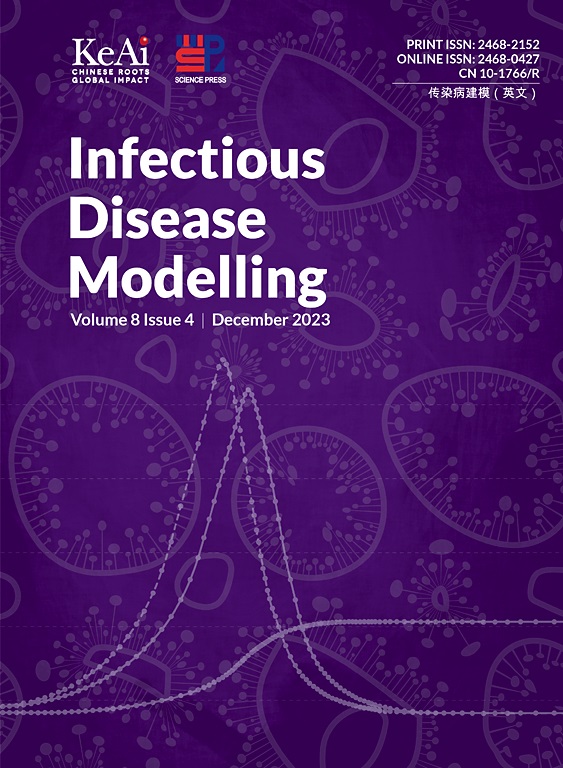网络上的随机SIRS模型:感染的均值和方差
IF 2.5
3区 医学
Q1 Medicine
引用次数: 0
摘要
由于接触结构的异质性,建立传染病网络模型更为合理。由于事件的随机性和个体数量的离散性,将流行病的传播视为马尔可夫链更为合适。因此,我们建立了网络上接种疫苗的随机SIRS模型,研究大规模人群中易感和感染个体数量的均值和方差。利用van Kampen的系统大小展开,我们导出了一个描述平均行为的高维确定性系统和一个表征确定性轨迹方差的Fokker-Planck方程。利用定性分析技术和Lyapunov函数,证明了当基本繁殖数R0 <;1;地方性平衡是全局渐近稳定的,如果R0 >;1. 通过对Fokker-Planck方程的分析,得到了流行平衡点附近易感个体数和感染个体数方差的渐近表达式,该表达式可以用相应Lyapunov方程解的主对角线元素近似表示。在这里,Lyapunov方程的解由矩阵的向量化算子和Kronecker积表示。最后,数值模拟表明,接种疫苗可以减少感染,增加感染个体数量的波动,并且程度越大的个体更容易被感染。本文章由计算机程序翻译,如有差异,请以英文原文为准。
Stochastic SIRS models on networks: mean and variance of infection
Due to the heterogeneity of contact structure, it is more reasonable to model on networks for epidemics. Because of the stochastic nature of events and the discrete number of individuals, the spread of epidemics is more appropriately viewed as a Markov chain. Therefore, we establish stochastic SIRS models with vaccination on networks to study the mean and variance of the number of susceptible and infected individuals for large-scale populations. Using van Kampen's system-size expansion, we derive a high-dimensional deterministic system which describes the mean behaviour and a Fokker-Planck equation which characterizes the variance around deterministic trajectories. Utilizing the qualitative analysis technique and Lyapunov function, we demonstrate that the disease-free equilibrium of the deterministic system is globally asymptotically stable if the basic reproduction number R0 < 1; and the endemic equilibrium is globally asymptotically stable if R0 > 1. Through the analysis of the Fokker-Planck equation, we obtain the asymptotic expression for the variance of the number of susceptible and infected individuals around the endemic equilibrium, which can be approximated by the elements of principal diagonal of the solution of the corresponding Lyapunov equation. Here, the solution of Lyapunov equation is expressed by vectorization operator of matrices and Kronecker product. Finally, numerical simulations illustrate that vaccination can reduce infections and increase fluctuations of the number of infected individuals and show that individuals with greater degree are more easily infected.
求助全文
通过发布文献求助,成功后即可免费获取论文全文。
去求助
来源期刊

Infectious Disease Modelling
Mathematics-Applied Mathematics
CiteScore
17.00
自引率
3.40%
发文量
73
审稿时长
17 weeks
期刊介绍:
Infectious Disease Modelling is an open access journal that undergoes peer-review. Its main objective is to facilitate research that combines mathematical modelling, retrieval and analysis of infection disease data, and public health decision support. The journal actively encourages original research that improves this interface, as well as review articles that highlight innovative methodologies relevant to data collection, informatics, and policy making in the field of public health.
 求助内容:
求助内容: 应助结果提醒方式:
应助结果提醒方式:


